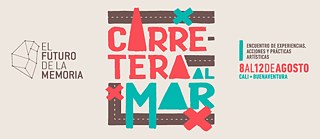Concept
Road to the Sea
During the second week of August 2018, Road to the Sea, an encounter of experiences, actions, and artistic practices, will be held in Cali at the La Tertulia Museum in the west side of the city and at the Nuevo Latir Library in the District of Aguablanca; and in Buenaventura, in the Isla de la Paz district of the Sixth Commune, at the Cultural Center of Banco de la República near the dock, and at Escuela Taller, among other places.
The project is based on the idea of the "Road to the Sea"—a link that has determined the intricate relationship between Cali and Buenaventura—as it critically exposes contradictions within the processes of colonization and modernization that have marked their history. Road to the Sea speaks of the dream and nightmare implied in the project to connect the valley with the ocean, of a territory turned into the journey between the sea and the inner country.By experimenting with tools of poetic and political action, the project brings together local organizations that have resisted hardship, pressure, and harassment by agents of power, and groups of artists and activists who have made initiatives to support and empower this resistance.
In the face of the current context of crisis, the project seeks different ways to act in the present, which involve drawing up the past and imagining the future. Through actions, interventions in the public space, and crosses between theater, radio, cinema, writing, and music, Road to the Sea combines imagination—which is unique to art-making—with political practice, exploring the potentials and contradictions of this connection, in order to question the hegemonic ways there are to narrate the common experience and imagine other ways to inhabit the present and talk about it.
Between the cities of Cali and Buenaventura, this Road to the Sea will bring a symbolic route involving artists, researchers, social leaders, and collectives—such as Aurora Vergara, Francia Márquez, Nidia Góngora, Puerto Creativo, Noís Radio and Miguel Tejada, Fabio Melecio Palacios, Mauricio Prieto, Victor González Urrutia—who will interact with guests from other regions of the country—such as Liliana Angulo and the CaldodeCultivo collective—and from other countries—such as Carlos Martiel from Cuba and Lucrecia Martel from Argentina—among others.
This proposal marks the end of the project The Future of Memory: Poetics of Memory and Oblivion in South America.” Therefore, it has the participation of guests and artistic initiatives that took place across the various cities, such as Miguel Rubio in Lima (Peru), the Etcétera collective in Buenos Aires (Argentina), indigenous Guarani leader Tiago Honório dos Santos from Sao Paulo (Brazil), Nathalia Macena from Vila Autódromo in Rio de Janeiro (Brazil), and Radio Conversa in Bogota, Soacha, and Buenaventura (Colombia). The project extends its landscape to the interventions of international guests such as Mario Bellatin (Mexico), Hannah Hurtzig (Germany), and Karin Harasser (Austria).
Workteam
Curatorial Proposal: Clara Ianni, Alejandro Martín, and Óscar Moreno Escárraga.
General coordination: Úrsula Mendoza Balcázar.
Research and production: Yolanda Chois Rivera.
The Future of Memory
Poetics of Memory and Oblivion in South America
Supported by the Goethe-Institut, The Future of Memory was developed in 2017 with the intention of opening an alternative space to think about memory and oblivion through artistic proposals from different cities: Bogota, Sao Paulo, Rio de Janeiro, Lima, Montevideo, Santiago, Buenos Aires, and now Cali and Buenaventura. This is a regional, transdisciplinary, and cultural dialogue that seeks to experience ways to encounter the present and make it common, ways of poetic and political occurrences, which are key to the debate about memory and oblivion.




